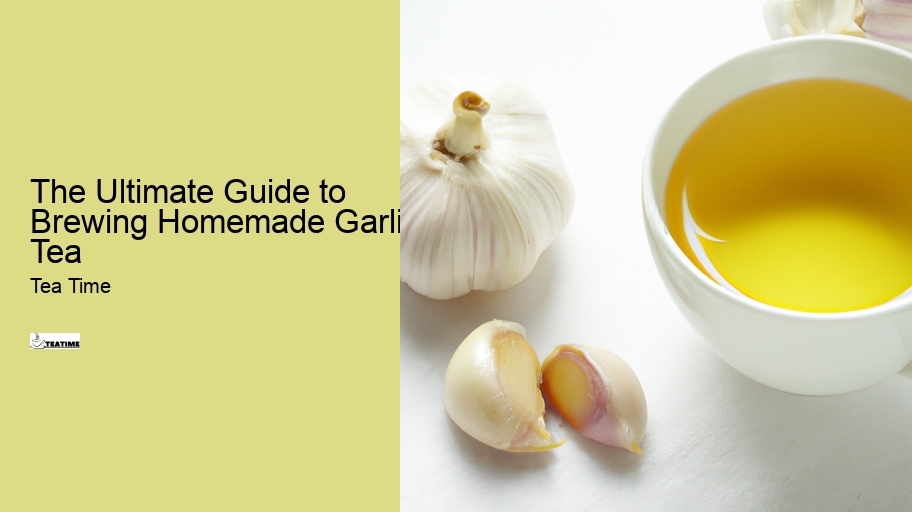

Garlic tea is renowned for its medicinal properties, a result of the potent compounds found in garlic. Allicin, the most notable of these compounds, is known for its antimicrobial, antiviral, and anti-inflammatory effects. Drinking garlic tea can thus help fight infections and boost overall immune health.
Regular consumption of garlic tea is beneficial for cardiovascular health. It aids in regulating blood pressure and cholesterol levels, reducing the risk of heart diseases.
Garlic tea has shown promise in research studies for its potential cancer-fighting properties. Its antioxidants help neutralize free radicals, reducing the risk of cancer cell formation. While not a cure, incorporating garlic tea into a healthy diet can be part of a proactive approach to reducing cancer risk.
Garlic tea serves as a holistic remedy, addressing various aspects of health. Its comprehensive benefits range from boosting immunity and digestive health to supporting cardiovascular and respiratory wellness. By integrating garlic tea into your daily routine, you embrace a more natural, wellness-focused lifestyle.
The adaptogenic nature of garlic helps in managing stress and enhancing overall well-being. Regular consumption of garlic tea can help in balancing the body’s responses to stress, promoting a sense of calm and relaxation. Herbal Infusions This makes it an excellent choice for those looking to manage daily stressors naturally.
Garlic tea's anti-inflammatory and antioxidant properties are beneficial for overall health maintenance. It aids in preventing chronic diseases, promoting healthy aging, and maintaining a balanced mood. As a natural, simple-to-make remedy, garlic tea stands as a testament to the power of herbal solutions in achieving holistic health.
While garlic tea is known for its health benefits, its flavor might need some refining to suit individual tastes. Enhancing the taste of garlic tea can make it a more enjoyable and regular part of your diet. Start by adjusting the strength of the tea; less garlic results in a milder taste, while more garlic intensifies the flavor.
Adding complementary ingredients can transform the tea. Honey or a natural sweetener balances the pungency of garlic, while lemon adds a refreshing citrus note. For a spicier kick, a slice of ginger or a dash of cinnamon can be included. These additions not only improve taste but also bring their own health benefits.
Experimenting with different brewing times and temperatures can also alter the flavor profile. A longer steeping time at a lower temperature can bring out a smoother, more nuanced taste. Finding the right combination of ingredients and brewing techniques can make garlic tea a delightful and healthful beverage.
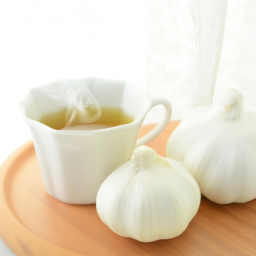
Garlic tea is a traditional remedy known for its positive impact on digestive health. The natural compounds in garlic, especially allicin, are beneficial in stimulating digestion and improving gut health.
The antibacterial properties of garlic aid in balancing gut flora, promoting a healthy digestive system. This is particularly important for those suffering from digestive disorders, as garlic tea can help in managing symptoms and restoring gut health. Furthermore, its anti-inflammatory properties can soothe the digestive tract, providing relief from irritation and inflammation.
Incorporating garlic tea into your daily routine can be an effective way to support digestive health naturally. Its gentle yet potent properties make it suitable for regular consumption, offering a simple and natural solution for maintaining optimal digestive function.
The preparation of garlic tea, whether hot or cold, can influence its health benefits. Hot garlic tea is ideal for immediate relief from respiratory ailments, providing a soothing effect. Medicinal Properties The warm brew helps in decongestion and is comforting during cold and flu season. The heat also aids in releasing more of garlic’s beneficial compounds into the tea.
Cold-brewed garlic tea, on the other hand, offers a refreshing alternative with a milder flavor. This method involves steeping garlic in cold water for several hours, resulting in a less pungent beverage. It's an excellent choice for those who find the taste of hot garlic tea too strong.
Both methods retain the health benefits of garlic, including its immune-boosting and antimicrobial properties. The choice between hot and cold garlic tea can depend on personal preference, the desired health benefits, and the specific ailment being targeted.
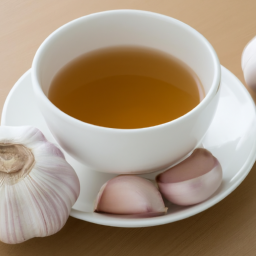
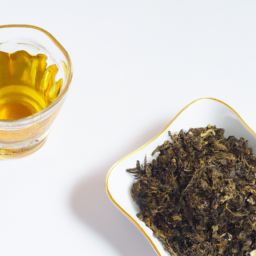
Preparing garlic tea is a straightforward process, allowing anyone to enjoy its health benefits with minimal effort. Start by selecting fresh, organic garlic cloves. Peel and crush them lightly to release the essential oils and active compounds. The number of cloves can be adjusted based on your taste preference and the desired potency of the tea.
Place the crushed garlic in a cup and pour hot water over it. Allow the mixture to steep for about 5 to 10 minutes.
Strain the garlic pieces from the tea, and it's ready to drink. You can enhance the flavor by adding honey, lemon, or ginger. These additions not only improve the taste but also complement garlic’s health properties, making the tea a more enjoyable and beneficial drink.
Garlic tea is an effective natural remedy for cold and flu symptoms. Its natural antibacterial and antiviral properties make it a powerful tool in combating these common illnesses. Drinking garlic tea at the onset of cold or flu symptoms can help in reducing their severity and duration. The key compound, allicin, has immune-boosting qualities that aid in quickly fighting off infections.
Consuming garlic tea during cold and flu season can also serve as a preventive measure. It strengthens the immune system, making the body more resistant to viruses and bacteria. The warm liquid of the tea provides soothing relief for sore throats, coughs, and congestion, making it a comforting remedy when feeling under the weather.
To maximize the benefits, it's recommended to drink garlic tea two to three times a day during illness. Cold and Flu Remedies Adding honey and lemon not only improves the taste but also provides additional soothing and antimicrobial properties. This simple, natural drink can be a valuable addition to your cold and flu care regimen, offering relief and promoting faster recovery.
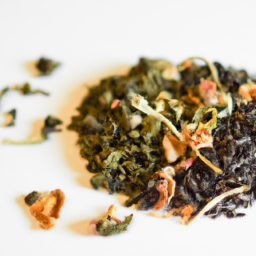
Garlic tea offers a range of health benefits due to its rich content of antioxidants and compounds like allicin. It's known for boosting the immune system, reducing inflammation, aiding in heart health by managing blood pressure and cholesterol levels, and it may also have antibacterial and antiviral properties. Additionally, it can aid in digestion and respiratory health, and some suggest it might help in weight management.
It's generally recommended to drink garlic tea earlier in the day. For some, garlic tea can be stimulating and might interfere with sleep if consumed right before bed. However, individual reactions can vary, so you may need to experiment to see how it affects your sleep.
Yes, garlic tea can be beneficial in relieving symptoms of colds and flu. Garlic has natural antibacterial and antiviral properties that may help in fighting infections. Drinking warm garlic tea can also provide soothing relief for sore throats and congestion.
To make garlic tea, start by peeling and lightly crushing 2-3 cloves of fresh garlic to release their oils. Steep the crushed cloves in a cup of hot water for about 5-10 minutes. Strain the garlic and add lemon or honey to taste, if desired. Adjust the amount of garlic and steeping time according to your taste preference.